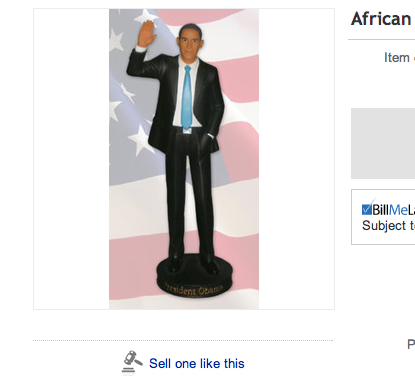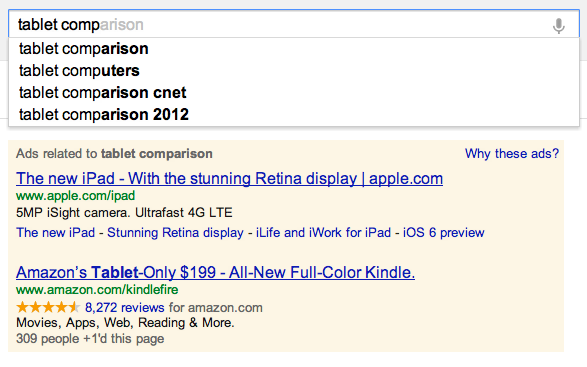Facebook and Twitter, after years of searching for the I-wanna-be-like-Google business model, have settled on ads. The oldest business model on the web, and perhaps the default. There is one pesky problem though: online ads are about matching intent: Alice sells Veeblefetzers. Bob wants to buy a Veeblefetzer today, and you know it. You put Alice and Bob in touch, and take a cut. Now suppose Carol comes to your site, and she has no interest whatsoever in Veeblefetzers. If you don’t know what Carol wants during a specific session, that session is not worth much.
What do Google, Ebay and Amazon have in common? You go there to ask for something. You type in “medical insurance”, “fake plastic trees”, “barack obama figurines.” These sites have something for you. Of course, Google has huge amounts of queries for which there’s nothing you’d want to buy. It doesn’t matter; the relatively small number of queries with intent to buy is large enough for them to make a fortune.
In contrast, you go to Facebook and Twitter to browse, post, interact. Not to shop. These sites rely on the data they collect about you to show ads based on your behavior. There are several problems with this approach. One of them is that they don’t know who we really are. People’s behavior on Facebook and Twitter is meant to be seen by others. We have an incentive to “Like” things that we don’t necessarily like in real life, or viceversa. Say, would you like this?
Still, suppose you hired the best private investigator to find out everything about me, and he delivered a thick file including details such as my favorite brand of underwear (by the way, I have enough of them to last me twenty years so I’m not buying any in the foreseeable future). The million dollar question is: how would you know what I want at this exact moment in time? Remington Steele or Maddie Hayes wouldn’t know much about my conversations with Google unless they had access to Google’s treasure chest of data, or to my full browsing history. Even then, Google has little idea of what I’ll ask next. I could be looking for a climbing gym in Houston, a music video, a dentist, etc. They will have to wait and find out. And find out they will.
With all this in mind, it’s no surprise that Facebook’s click rates are dismal. Perhaps things will be better in the mobile world: both Facebook and Twitter claim to have much better click rates on mobile. However, I suspect that the rate of accidental clicks on mobile is also much higher than on the desktop. No word on the conversion rates of those clicks, which is ultimately what advertisers are seeking.
Why is this a problem for Facebook and Twitter? Because they have to sustain insanely high valuations demanded by their investors. If they try to do it with ads, they will be compared against Google and almost certainly look like losers. Maybe they will figure out a new business model one day, but I’m not betting on it.
Now come follow me on Twitter. Let’s enjoy their fine service and continue to pay them nothing! 🙂



All the search engine giants, and Social Media companies are working on contextualizing web and interactions, only that they are not using where it is hurting them the most.
After attending some tech seminar on one company’s context mining session, I went there to see if the experience and understanding of my query is right, but so unfortunate they don’t seem so.
When I search for my son’s nursery rhymes on youtube ads I often get are completely irrelevant. I need to put the safe filter on for my son to make sure those stupid offensive ads are not being displayed while he is watching “Wheels on the Bus”, Then His Pussy Cat rhyme doesn’t play claiming adult content or not safe to watch.
There is research, and so dis-organised unfortunately making them think beyond the syntax.
It seems to me that consumer tech startups have a default belief that selling the promise of sales is easier and more lucrative than selling something directly. It’s like a slightly fancier version of the “how to make money online” courses.
They also seem to look down on selling their products directly to users (“we don’t want to nickel and dime our users”). They have a strange attraction to portraying this benevolent change-the-world-for-free image (see http://help.kik.com/customer/portal/articles/654821).
I suspect there are big unexplored opportunities for selling software services directly to consumers – things which improve people’s lives noticeably, without them having to first do a ton of donkey work (checking in, writing reviews, etc). But, the approach to building such products would be to go deep on a specific problem in a small market and expand only when you’ve nailed that business. Unlike typical consumer startups, the focus should be on high quality not scale.
Anyway, I am working on some ideas along these lines. I shared my perspective to clear my thinking and also hear what you think about it.
Oh and thanks for introducing me to the delightful word Veeblefetzer!
Diego, great post. Like somebody else said “Facebook is like Starbucks, people hang out but don’t buy anything”.
I’m interested in your thoughts on why Linkedin has such a different performance. I liked this article about it > http://www.pehub.com/161821/why-was-linkedins-ipo-so-successful-when-those-other-social-ipos-stunk/ , but I’d love to hear your thoughts at some point. Cheers!
Hrishi, I agree. The main problem is that selling software services would not justify the insane valuations that Facebook and Twitter have. They want to be in the same league as Google or LinkedIn, and the numbers just wouldn’t work out. Perhaps it will work out for app.net; nothing wrong with making $5M/year and being valued at, say, $70M.
Diego S, look at the main revenue source from LinkedIn’s earnings report. It’s hiring solutions. Ads are a distant second:
http://press.linkedin.com/node/1223
I disagree big time.
At least on twitter it’s pretty easy to figure out what people might want by judging at what they say and from where they say it.
just look on twitter for:
“i want”
“i hate”
“i love”
“i wish”
“i need”
and have the right answers in form of ads.
This would probably be the simplest approach about knowing intent.
But yes, twitter and facebook are (at this point in time) places to come and chill, rant, ask, learn about others, but that doesn’t mean their horizons are so limited, who’s to say Facebook won’t become an ID issuer and then a currency issuer online (paypal competitor, or even amazon partner or amazon competitor), after all people want what others have, who’s to say the photo analysis facebook does is not only for faces, but for what clothes or products appear on the pictures.
Very naive post.
Angel, you say naive? “who’s to say” is as speculative as it gets. Facebook and Twitter have explored monetization for years, and the best they could come up was ads. Have you tried to analyze tweets starting with “I want”, etc? These are the results for “i want” *right now*: http://i.imgur.com/ZIOEy.png
Good luck extracting intent and monetizing that!
I only have one question, because I normally like Diego’s thinking:
Did he just figure this out?
I’ve been working on a project for a ridiculously long time that is centered around the ideas he mentioned here. Someone should have beaten me to the market long ago. But it never happens. Why?
Programmers love indirection and I’d guess this is yet another example. Instead of going for the most direct approach – connecting buyer and sellers – they want to covertly compile endless statistics about users, build directed graphs, and then try to make inferences.
If Diego is just trying to drive home some common sense to these programmers, then I understand. But if he’s just realising this himself, I’m a little surprised.
Facebook’s most successful ad campaigns ever were “Party Poker” styled pop-ups for gambling sites. These were of course quickly removed as Facebook evolved past a place for students and set its sights on doing business with corporate America.
Display ads work, but they are usually the web equivalent of late night infommercials: appeals to the base instincts of the weak-minded.
These type of ads only work as long as you have massive viewership (massive traffic), because they can only work on a small minority of weak-minded, easily persuaded viewers from a larger, sensible minded pool. Which is why display ads have to strewn all across the web, not just at one site, in order to be most effective.
When the traffic slows, and the viewership of the display ads declines, everything goes downhill, fast. If Facebook and Twitter are trends (does anyone disagree they aren’t?), then they have a potential problem when the next new thing comes along.
Google and Amazon are of course in a different catgeory. They directly connect buyers with sellers. Strange as it may sound, they don’t necessarily need massive traffic, only consistent traffic; so long as they remain the web’s equivalent of the yellow pages and the shopping mall, respectively, they will do fine. They only need to maintain their position as the “defaults” for most web users in these categories. If they consistently match consumers with high priced items and services, deep pocketed advertisers will always be willing to pay a premium.
JustSomeGuy, perhaps I’m beating a dead horse here. I’ve used this argument to sell search to sites since 2005: search is when people tell you what you want. I’m a bit frustrated by the fact that many people (not just programmers but also marketers) don’t seem to get exactly what you said about indirection and inferences.
Regarding inference, the point is we are much less unique than we’d want to be. Knowing I have X doesn’t mean I’ll buy more of X in the foreseeable future, as in your underwear example. But if it turns out many of the people having X are buying Y, there’s a good chance I’d like buying Y too.
Now, is that worth the crazy valuations we’re seeing in a very different question.
dbasch, I’m relieved to know you’re beating the dead horse, as you put it. Even if it might be futile (or maybe not, how successful have your pitches been?), it assures me there are some folks in this business space who have an ounce of common sense.
When you criticise Facebook or Twitter on the web, it always draws responses from coders trying to defend their ideas, which always involve snooping on people and trying to guess things about them. It is baffling to me. How many coders like this are out there?
What we need is coders with common sense. People who have spent time in the real world, not merely in an imaginary one shaped by maths and statistics.
Anyway, one way to look at this situation is as an opportunity. There is vast room for improvement.